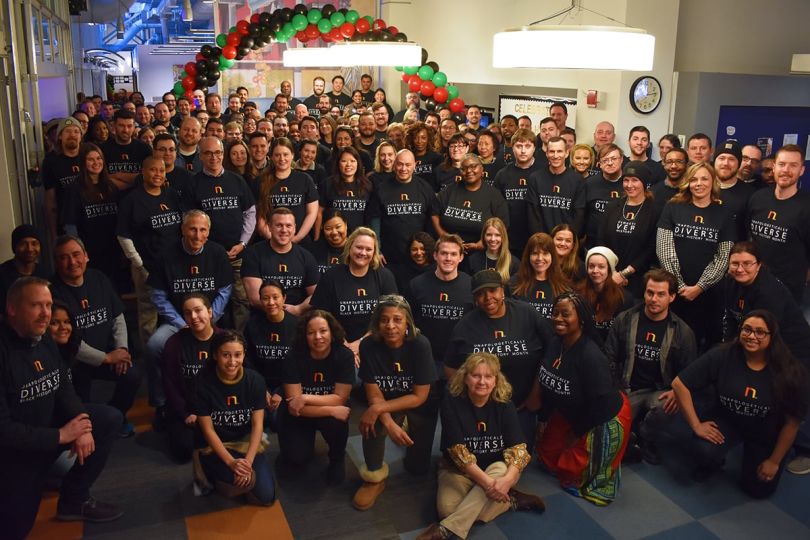Sales teams across Chicago are growing — in size, in workload, in ambition.
The rise of remote work has altered how salespeople interact with their clients and each other, with the Hubspot Research Global Sales Enablement Survey 2020 finding that over 64 percent of sales teams that exceeded their revenue goals were automating at least part of their sales process — a number that continued to grow in 2021. Furthermore, a 2020 survey from Bain & Company found that 80 percent of respondents believe that virtual interactions in sales will continue to increase after the pandemic, providing an insight into how the role will transform in the coming years.
It wasn’t all inspiring news, though. The Virtual Selling Skills & Challenges Report published by RAIN Group found that 91 percent of salespeople found gaining a buyer’s attention and keeping them engaged virtually to be far more difficult than during in person meetings, and 80 percent agreed that making the transition to virtual selling was a lot harder than expected. The stakes of hiring adaptable team players into what has traditionally been seen as an individualist role have never been greater — so how is a successful sales team built to last in the current climate?
As remote work and automation expects higher productivity from existing teams, companies looking to scale need adaptable salespeople to ride the wave. Scaling efficiently requires forethought and knowledgeable leadership — as well as flexible and passionate team members.
The ability of sales teams to scale and adapt without losing the elements that made them great is essential to success in 2022 and beyond. To learn more, Built In Chicago sat down with four industry leaders to talk about their tips for building a successful sales team, what they look for when hiring a new salesperson and how to maintain their culture while scaling.
What’s your blueprint for building a successful sales team?
There is no right or wrong answer. No silver bullet. My approach to building successful sales teams is to take it one step at a time. Understand what the current state of the team and organization is and what is the desired state.
As a leader, it is my job to be as transparent as possible — to set clear, easy-to-understand goals and expectations and communicate them early and often. It is important to set lofty goals to encourage creativity, collaboration and strategic thinking, and after establishing this foundation, you can focus less on what needs to be done and more time on how to get there. Incorporating data is integral to pulling this all together, as data bridges the gap of what is working and what are potential areas of opportunity.
What’s the most important characteristic you look for in a salesperson and why?
There are several characteristics that make someone successful in sales. I am constantly looking for people who are coachable, intrinsically motivated and passionate about their own personal and professional development.
I always say there are two pillars to any successful sale — trust and value. If you don't have both, you will not get the sale. Sales reps need to be building trust from the moment they connect with a prospect. By listening to the customer’s pain points and asking meaningful questions, you are establishing trust and can get a better understanding of how your product can bridge the gap between current state and desired state. The most successful sales reps are not selling features and benefits upfront, but selling a solution to their prospects’ problems, and they do that by understanding and listening to their prospects’ needs.
The most successful sales reps are not selling features and benefits upfront, but selling a solution to their prospects’ problems.”
When scaling, how do you ensure your team doesn’t lose the processes and culture that made it so successful in the first place?
Be intentional and hold the bar high. Culture will always be what you make of it. Finding the right people who amplify positive trends is critical for buy-in from the masses. Determine what is working well and figure out how to scale that one particular action or activity. Tap into the “why” of every team member and determine a mutually agreed upon mission for the individual and for the team. High-performing teams will thrive when they feel as though they are part of the big picture and their inputs are critical for success. Consistently referring back to these principles allows for constant agility when scaling, as change is the only predictable constant in sales.
What’s your blueprint for building a successful sales team?
At a high level, you want to build expertise across four buckets. The first bucket is alignment across the team — who is your ideal profile for each role, what is the optimal hiring process and how do you measure the success of that hiring process? The second bucket is aligning on who you’re going to sell to and how you’re going to win their business. This will provide you the focus to make sure your team is going after the right customers. The third bucket is to optimize and align on how you will enable these teams. This encompasses onboarding, providing all the right tools and content, as well as implementing a culture of coaching across your leadership team. For the fourth and final bucket, it’s crucial to drive an operational cadence focused on leveraging data to make the right decisions.
This blueprint is really at the center of everything we do. Obviously, you can tweak things as you go along and you should always be looking to improve your processes, but we measure ourselves on each one of these buckets.
What’s the most important characteristic you look for in a salesperson and why?
We’ve found that coachability is the number one attribute that correlates to success. Characteristics like intelligence, business acumen, brevity and grit are all important — but we find that someone who is coachable has a much greater chance at being successful. As a bonus, coachable salespeople often strive to improve those around them.
Coachability seems simple, but in a profession like sales, everything is always changing. It’s important that we have sellers who can adapt to that change and remain open to ongoing improvement. We also find that coachable people self-diagnose issues faster — they are inherently looking for ways to improve. At Showpad, we search for this attribute from the initial interview and then we foster an environment of coaching throughout each salesperson’s career.
We foster an environment of coaching throughout each salesperson’s career.”
When scaling, how do you ensure your team doesn’t lose the processes and culture that made it so successful in the first place?
Obviously, we are huge fans of our own solution to drive that scalability in enablement. We “drink our own champagne” across every part of our seller’s journey. The most important part is to start at the beginning. Do you know the attributes that make up a great sales rep at your company? If so, write those skills down and document ways to uncover it in the interview process. Then, engineer the interviews so that they’re the same each time. Once you’ve hired the right person, onboard them with all of the information they need to do their job and continue to track those skills at the macro level to make sure they still correlate with performance as they become more tenured at the company. Once you have a view into where the gaps are, you can design both 1:1 and team-wide opportunities for training or skill development.
From implementing this process at Showpad, I am able to design training programs that correlate to success. I know the skills that lead to success, I know how each team member ranks in that skill and I have a data-driven understanding on what training the team needs. We can also apply that at the individual level so that all reps get individualized coaching plans. You can’t improve on what you don’t measure and just measuring outputs makes it difficult to take action.

What’s your blueprint for building a successful sales team?
Building a culture centered on trust is the blueprint for building a successful sales team. When my teammates trust one another, it allows an open dialogue where people can learn and grow. The outside sales environment can be very challenging — we wake up every morning knowing there is a quota to be secured. There is no better way to overcome these challenges by maintaining a culture of trust that allows people to take calculated risks, raise their hand when they need help and perform at their natural best. My team consists of nine outside sales executives and two strategic account managers, and although each person has their own individual goal, there is a sense that we are all in this together. Each team member is not only held accountable by the goals laid out by the company, but an accountability for success exists between each person.
Finding individual contributors that are team-oriented is crucial to the overall success of any organization.”
What’s the most important characteristic you look for in a salesperson and why?
There are three must-haves that I look for in any salesperson. First, I look for people who are consistently trying to improve themselves on either a personal or professional level. The sales landscape is constantly changing, so people who are willing to grow and improve themselves are always the ones that can succeed in the environment. Secondly, I look for people with a strong will. Coaching and improving a skill set is very achievable, but developing someone’s will to win can be tricky. Lastly, I am looking for team players. Finding individual contributors that are team-oriented is crucial to the overall success of any organization. Salespeople who have demonstrated how they have helped teammates reach their goals is something I hold in the highest regard.
When scaling, how do you ensure your team doesn’t lose the processes and culture that made it so successful in the first place?
Consistent employee engagement and training are the key ingredients in ensuring future success. I am fortunate enough to have all eleven of my employees within a 90-minute drive of each other, so before the pandemic, we were able to get the team together at least once per quarter to improve morale and build relationships. In the world of Covid-19, we are still able to step away from the zoom calls and physically meet everyone, which has made all the difference.
Weekly remote huddles that are focused on training and best practices always ensure improvement in the sales world. Our remote meetings are centered around improving everyone’s skill set regardless of your tenure.

What’s your blueprint for building a successful sales team?
The three areas we focus on the most when building our sales teams are tenure, relationships and experience. Given that we represent sizable brands, our sales team needs to be tenured with years of industry experience in order for our brands to trust us to represent them. While there are many aspects of sales that are critically important — data, innovation, margin, top line dollar sales — our industry is still very relationship driven, so we look at each retailer that we are hiring for and ensure that the candidate has solid relationships with that retailer. Finally, experience and background are very important. We like to hire straight from retailers or bring in people that have worked with a particular retailer for years — this sets us up for success right out the gate!
Relationship building and maintenance is paramount to our sales team success.”
What’s the most important characteristic you look for in a salesperson and why?
We look for the ability to build and maintain relationships. There are many stakeholders that we need to deliver for, including clients, retailers and our own internal organization. There is a lot of complexity in our work and a lot of trust is put in our sales team on behalf of our brands, so we need to be able to deliver against expectations coming at us from many different angles. We need to act as owners of both our business and our clients’ brands, have the necessary and sometimes hard conversations, and celebrate successes along the way. There are lots of competing priorities within the agency world, so relationship building and maintenance is paramount to our sales team success.
When scaling, how do you ensure your team doesn’t lose the processes and culture that made it so successful in the first place?
This is perhaps the most challenging and exciting aspect of our growing organization. We pride ourselves on the boutique approach that has been core to our organization from the beginning and maintaining that level of service will always be a major differentiator for us. It requires a lot of agility from our teams, as no two client or customer experiences or expectations are the same, so we have to be very nimble and willing to adjust as we go. I’ve personally been so inspired by the eagerness of our people to evolve each day. We connect and discuss this many times a week, offering suggestions and recommendations throughout our organization. It is important for our employees to understand this approach before they join our organization, so it is discussed during the interview and hiring process. Our employees fully embrace this fact and view it as a main reason to work here. We’re a true “better every day” organization and that allows us to scale smartly.












